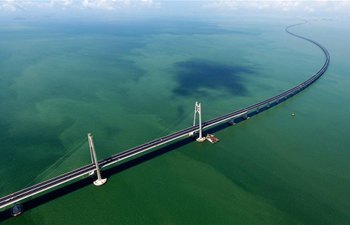SYDNEY, Oct. 29 (Xinhua) -- Australian scientists on Monday said they have identified coral reef sites worldwide that are best suited to face climate change and help other reefs regenerate, as part of a major strategy to secure the long-term future of the marine ecosystem.
The strategy "focuses on well-connected coral reefs that have the best chance of surviving projected climate change," the University of Queensland's Professor Ove Hoegh-Guldberg said a statement.
The team used mathematical analyses to account for some of the climate uncertainty and identified 50 sites that are likely to provide "a good return on investment for long-term coral reef preservation," according to the university.
The global community should strengthen existing conservation and invest in new efforts that cover 500 square km of coral reef in areas such as Brazil, Caribbean, East Africa, and the Great Barrier Reef, said the researchers. Their work was published in scientific journal Trends in Ecology and Evolution.
"By encouraging sustainable farming and waste management practices which reduce coastal pollution and better regulating fishing harvests, we can dramatically improve the projected outcome for many of the nominated sites," said the university's Dr Hawthorne Beyer.
Scientists predict that even if global warming is limited to 1.5 degrees Celsius by 2050, coral reefs are still likely to decline by as much as 70 percent to 90 percent under the changing marine environment with higher temperatures affecting their growth, according to the university.
"The planet is warming, it has already warmed by one degree since pre-industrial times, and we are continuing to track towards two degrees," said university researcher Dr Emma Kennedy.
"What we propose is a global strategy for reef conservation - like an insurance policy for reefs - that involves finding the 10 percent to 30 percent of reef areas that might still be habitable in the long term."










